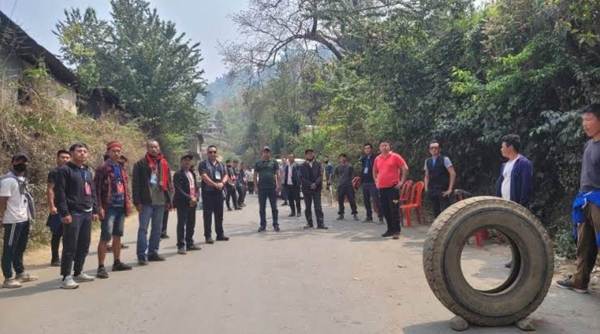Manipur Security Forces & Forest Department Destroy Illicit Poppy Cultivation in Tamenglong: A Step Towards a Safer Future
News Summary
In a decisive move on February 20, 2025, Manipur’s security forces in collaboration with the Forest Department dismantled an illicit poppy cultivation operation in Tamenglong. This operation marks a significant stride in curbing illegal drug production and safeguarding the region’s ecological balance. Authorities have issued stern warnings to deter similar activities in the future, emphasizing the importance of protecting both public safety and natural resources.
In-Depth Analysis: Uncovering the Battle Against Illicit Poppy Cultivation in Tamenglong
Introduction
Have you ever wondered what it takes to protect nature and ensure a safer community simultaneously? Imagine a scenario where dedicated security forces and environmental stewards come together like a well-coordinated team to tackle a common enemy—illegal activities harming both people and the environment. In Tamenglong, Manipur, this is exactly what happened. On February 20, 2025, authorities launched a robust operation to eradicate illicit poppy cultivation, a move that not only disrupts the illegal drug trade but also safeguards our forests and local livelihoods. Today, we’re going to explore the ins and outs of this operation, why it matters, and how it sets the stage for a brighter, safer future for the region.
Understanding the Context: Why Poppy Cultivation Is a Problem
Before we dive into the specifics of the operation, let’s set the scene. Poppy cultivation, when done illicitly, is the breeding ground for narcotics that can fuel addiction and criminal networks. You might think of it as a dangerous weed in a garden that, if left unchecked, can overrun and destroy the beauty and order of the entire landscape.
The Dark Side of Poppy Cultivation
- Illegal Trade and Drug Production:
Illicit poppy cultivation is often linked to the production of opium and other narcotics. These substances can devastate communities by driving addiction, fueling crime, and destabilizing local economies. - Environmental Impact:
Illegal cultivation often leads to deforestation, soil degradation, and water resource depletion. When forests are cleared to grow poppies, it’s not just a loss of trees; it’s a loss of biodiversity and natural protection against erosion and floods. - Social and Economic Fallout:
Communities involved in or affected by these activities often suffer from violence, social disruption, and economic instability. The profits from illicit crops rarely benefit the local population, leading to a cycle of poverty and exploitation.
The Operation: A Coordinated Strike Against Illicit Activities
Now, picture this: a team of well-trained security forces and vigilant forest officials working in unison, moving silently through dense forests, armed not only with weapons but with the determination to protect their land. That’s exactly what happened in Tamenglong.
How the Operation Unfolded
- Intelligence Gathering:
Just like piecing together a jigsaw puzzle, authorities collected detailed intelligence from multiple sources. Local informants, satellite imagery, and on-ground surveillance helped map out the illicit cultivation areas. It’s as if someone handed them the blueprint to an underground factory. - Strategic Planning and Coordination:
Once the intel was in, the operation was meticulously planned. The security forces and Forest Department synchronized their efforts, ensuring every step was calculated. This collaboration is reminiscent of a well-choreographed dance where every move matters. - On-Ground Execution:
In the early hours of the day, teams moved in swiftly. With minimal resistance, they began dismantling the poppy fields. The destruction of these fields wasn’t just a physical act—it was a powerful message: illegal activities will not be tolerated. - Seizure and Disposal:
Authorities confiscated a large quantity of poppy plants and related paraphernalia. The subsequent disposal of these materials ensured that the illicit operations could not be revived quickly. Think of it as pulling a weed out by its roots to prevent it from growing back. - Public Warnings and Future Prevention:
Following the operation, stern warnings were issued to anyone involved in similar activities. This wasn’t just about punitive measures; it was a proactive step towards long-term prevention. The message was clear—nature and law will be defended at all costs.
The Role of the Indian Security Forces and Forest Department
Let’s take a moment to appreciate the heroes behind the scenes. The collaboration between the security forces and the Forest Department highlights the multi-faceted approach needed to tackle such complex issues.
Security Forces: Guardians of Public Safety
The role of the security forces in this operation was pivotal. Their expertise in rapid response and tactical execution ensured that the operation was both swift and effective. Here’s how they contributed:
- Rapid Deployment:
Quick mobilization is crucial when dealing with illegal activities. The security forces’ ability to deploy rapidly prevented the criminals from escaping or covering their tracks. - Law Enforcement:
Their involvement not only disrupted the current illegal operations but also sent a strong message to future offenders. Their presence is a deterrent, reminding everyone that the law is always watching. - Collaboration with Local Communities:
By working closely with local residents, the security forces also built trust and garnered invaluable local intelligence.
Forest Department: Protectors of the Environment
The Forest Department played a key role in ensuring that the natural environment is safeguarded from the ravages of illicit cultivation. Their contributions included:
- Environmental Protection:
By removing the poppy plants and restoring the affected areas, the Forest Department helps in the recovery of the local ecosystem. - Sustainable Management:
They ensure that any land previously used for illegal cultivation is rehabilitated for legitimate uses, such as agriculture or conservation. - Community Engagement:
Educating local communities about the importance of forest conservation and the dangers of illicit cultivation is a vital part of their role.
Why This Operation Matters: The Bigger Picture
You might ask, “Why does this matter to me?” Whether you’re directly impacted or not, the implications of this operation resonate far beyond the borders of Tamenglong.
Promoting Rule of Law and Order
Every time illegal operations are dismantled, it reinforces the rule of law. It sends a powerful message that illegal activities, no matter how deeply entrenched, will eventually be exposed and eradicated. This not only protects citizens but also builds trust in governmental institutions.
Protecting the Environment
Forests are the lungs of our planet, and protecting them is crucial for a sustainable future. By targeting illicit poppy cultivation, authorities are not only combating the illegal drug trade but also preserving the natural beauty and biodiversity of Manipur.
Economic and Social Benefits
When illegal activities are curtailed, it creates an environment where legitimate businesses can thrive. This boosts local economies and ensures that profits from agricultural activities benefit the community. Moreover, it reduces the social ills associated with drug trafficking, such as addiction and violence.
A Blueprint for Future Operations
This successful operation in Tamenglong sets a precedent for similar actions in other regions. It demonstrates that with proper planning, collaboration, and execution, even the most challenging illegal activities can be tackled head-on. It’s a reminder that persistent efforts and cooperation can lead to lasting change.
Challenges and Future Outlook
No operation is without its challenges, and this one is no exception. While the immediate impact is commendable, there are several hurdles to overcome to ensure long-term success.
Sustaining the Momentum
One of the biggest challenges is maintaining the momentum. Once an operation is over, it’s crucial to implement measures that prevent the resurgence of illegal activities. This means:
- Ongoing Surveillance:
Continuous monitoring of the affected areas to ensure that illicit cultivation does not reappear. - Community Involvement:
Engaging local communities in the protection and sustainable use of their natural resources. - Policy Implementation:
Strengthening laws and regulations to deter future offenders and penalize those who attempt to revive illegal operations.
Economic Alternatives for Locals
For many communities, illicit cultivation might be seen as a quick way to earn money, especially in regions where economic opportunities are limited. It’s essential to provide these communities with viable economic alternatives. This could involve:
- Agricultural Support Programs:
Offering training and financial assistance for sustainable farming practices. - Job Creation:
Encouraging industries that contribute to the local economy while preserving the environment. - Educational Initiatives:
Creating awareness about the long-term benefits of sustainable practices over short-term gains from illegal activities.
Environmental Rehabilitation
The environmental damage caused by illicit cultivation can be significant. Restoring these areas to their natural state is a long-term process that requires:
- Reforestation Projects:
Planting native trees and vegetation to restore the natural ecosystem. - Soil Rehabilitation:
Implementing techniques to restore soil health and prevent erosion. - Water Resource Management:
Ensuring that local water sources are protected and rehabilitated to support both human and ecological needs.
The Role of Technology in Future Operations
Technology is a game-changer in modern law enforcement and environmental protection. In future operations, integrating advanced tools can make a significant difference:
- Satellite Imagery and Drones:
These can be used for real-time monitoring of large and remote areas, ensuring that any illicit activities are detected quickly. - Data Analytics:
Using data to predict trends and identify potential hotspots can help in deploying resources more effectively. - Mobile Applications:
Empowering local communities with apps to report suspicious activities can enhance vigilance and cooperation.
Community Stories: The Human Element
At the heart of every operation are the people whose lives are affected. In Tamenglong, local residents have shared their experiences, expressing relief at seeing the operation succeed. One local farmer mentioned, “Our community has suffered for too long because of these illegal activities. Now, we can look forward to a future where our land is respected, and our children can grow up in a safer environment.”
These stories remind us that the fight against illicit cultivation is not just about enforcing laws—it’s about restoring dignity, hope, and opportunities to communities that have been marginalized by illegal practices.
A Collaborative Future: Government, NGOs, and Communities
The success of this operation is a testament to what can be achieved when various stakeholders come together. It’s not just the security forces or the Forest Department working in isolation; it’s a joint effort involving government agencies, non-governmental organizations, and local communities.
Public-Private Partnerships
In the future, encouraging partnerships between the public and private sectors can help in creating sustainable models for development. For instance, initiatives that combine economic incentives with environmental protection can ensure that local communities are directly involved in preserving their natural resources.
Education and Awareness Programs
Continuous education is key. Regular workshops, training sessions, and public awareness campaigns can help instill a culture of environmental stewardship and lawful conduct. When communities understand the long-term benefits of sustainable practices, they become active participants in protecting their land and heritage.
Reflections and the Road Ahead
As we reflect on the successful operation in Tamenglong, one thing becomes clear—this is not just a victory against illicit activities, but a step towards a future where law, order, and nature coexist harmoniously. The operation has set a benchmark for future initiatives, demonstrating that with determination, collaboration, and the right tools, even the most entrenched illegal practices can be uprooted.
Imagine a future where every patch of land in Manipur is used for sustainable agriculture, where forests flourish, and communities thrive in an environment free from the scourge of illegal activities. It’s an ambitious vision, but one that is increasingly within reach as more stakeholders join hands to protect the natural and social fabric of the region.
Conclusion: A Call to Action
The destruction of illicit poppy cultivation in Tamenglong is a beacon of hope—a clear signal that the battle against illegal activities and environmental degradation is being won. But the work doesn’t stop here. It’s up to all of us—government officials, community members, and even everyday citizens—to carry forward this momentum and build a future that prioritizes sustainability, lawfulness, and social well-being.
Let this operation be a reminder that every effort counts, every action makes a difference, and together, we can create a safer, healthier, and more prosperous future for all.
Frequently Asked Questions (FAQs)
- What led to the destruction of illicit poppy cultivation in Tamenglong?
The operation was driven by comprehensive intelligence, rapid coordination between security forces and the Forest Department, and a commitment to eradicating illegal activities that harm both public safety and the environment. - How does illicit poppy cultivation affect local communities and the environment?
Illicit poppy cultivation fuels the illegal drug trade, leads to deforestation, degrades soil quality, and causes social and economic instability by undermining local livelihoods and public health. - What role did the Forest Department play in this operation?
The Forest Department was instrumental in identifying and dismantling the poppy fields, ensuring that the affected areas are rehabilitated and restored for sustainable, legal land use. - How can technology help prevent future illicit cultivation activities?
Advanced tools like satellite imagery, drones, and data analytics can enhance real-time monitoring and predictive analysis, enabling authorities to detect and prevent illicit cultivation before it escalates. - What measures are being taken to support local communities affected by these operations?
Authorities are working on sustainable development initiatives, offering economic alternatives, and engaging local communities through educational and awareness programs to ensure long-term positive change.


